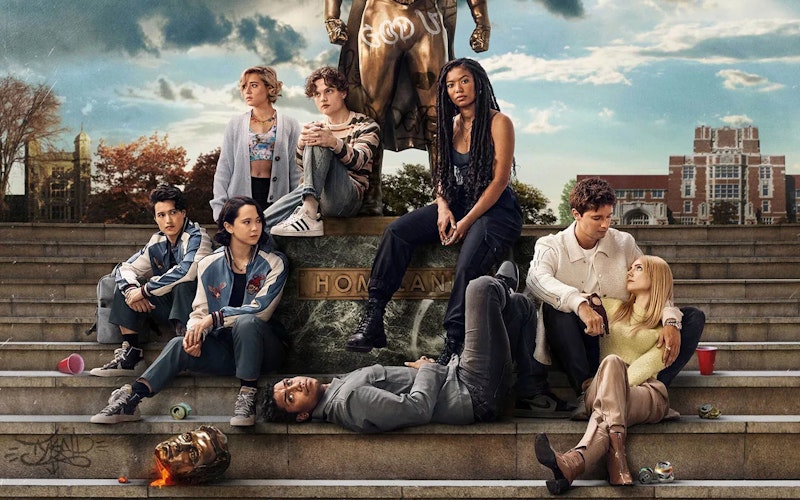Amazon Prime Video’s The Boys debuted in the summer of 2019, when the superhero genre had reached its apex. It was earlier that same summer that Avengers: Endgame briefly eclipsed Avatar to become the highest-grossing film of all-time, and it would be only a few months until Joker became the first R-Rated film to gross $1 billion, and received 11 Academy Award nominations. The Boys was hardly the first deconstruction of comic book archetypes, and its satire of superhero names, costumes, and culture was broad. However, The Boys’ significance was how it envisioned superheroes as modern celebrities, who existed to support and maintain brands, corporations, and the military-industrial complex. It’s ironic that such a satire of capitalism debuted on a service owned by Jeff Bezos, but showrunner Erik Kripke deserved credit for The Boys’ unbridled nastiness.
The declining interest in Marvel and DC characters didn’t harm The Boys because it became more closely aligned with current events; in its fourth season, a warning aired before the season finale, which featured a brutal act of political violence only days after the assassination attempt on President Trump. The Boys may have been radical, but it was also impossible to prevent any successful series from being a launching pad for spinoffs. Even if The Boys created a universe that invited the possibility of tangential stories, it was going to be hard for it to become a franchise without feeling completely antithetical to its core message.
The spinoff series Gen V took a gamble, as its events run simultaneously to The Boys. A spinoff show like Better Call Saul had the benefit of being set before the beginning of Breaking Bad, but Gen V assumed its audience was already caught up with everything that had happened within the first few seasons of The Boys. The perspective was slanted; The Boys centered around a gang of vigilantes who took down abusive superheroes, whereas Gen V followed a group of young adults who studied at a university for superpowered individuals.
Gen V is a success because it’s an acknowledgement of the fundamentals of comic book storytelling, but also has something to say about the notion of "exceptionalism" among today’s youth. Any comic book fan can remember the countless instances in which the mantle of a superhero identity is passed between characters, which allowed for the iconography to exist beyond just one lifetime. The adjustment between generations is more stringent in Gen V because the younger generation of heroes are aware of the atrocities committed by their forebearers. The question that protagonists like Marie Moreau (Jaz Sinclair), Andre Anderson (Chance Perdomo), Emma Meyer (Lizzie Broadway), and Cate Dunlap (Maddie Phillips) face is the same that any new members of a storied institution are forced to consider; is it possible to change a corrupt organization from inside, or is any involvement complicit in the restoration of its legacy?
The stickiness of this debate is more complex due to the show’s satire of the ways in which college campuses have become battlegrounds for the culture war. Education isn’t just a pathway to employment in America, but a means to earn social clout; for the characters in Gen V, graduation from the prestigious Godolkin University School of Crimefighting is a guarantee they’ll become dutiful employees of the defense contractor Vought International. Although Gen V has a more diverse cast than The Boys, the protagonists must cope with their identities hijacked for the sake of mass media talking points.
Gen V is more disturbing than The Boys; while the parent show took sick pleasure in the graphic dismemberments possible with superpowered characters, Gen V has attained a Cronenbergian level of body horror, in which aspiring superheroes see their forms tormented and distorted. Even if it’s aimed at a mature audience, Gen V contains the storytelling hallmarks of a young adult adventure saga; similar to Harry Potter or Percy Jackson, the characters attend classes in between their life-or-death adventures. A decade earlier, the idea that a fictional school could be operated in wake of such devastation was ridiculous; however, the narrative of Gen V is authentic in 2025, in which school violence is rarely out of the news.
What began as a means to cash in on the popularity of The Boys has become a more intriguing show because of its unshackled narrative. The Boys may have taken some dramatic twists on its original source material, but the core story is largely faithful to the graphic novel series by Garth Ennis. The characters in Gen V originated in the comics, but the show doesn’t have an overarching end point that it has built towards. Although there’s something rewarding about a show that’s meticulously planned from the beginning, fidelity to a preordained structure can be detrimental to pacing; for The Boys, the fourth season felt like filler inserted to build momentum towards the fifth and final run of episodes.
Gen V’s willingness to reinvent itself may prove to be its greatest asset. The Boys’ cryptic warnings about a potential fascist movement, while fascinating in its early seasons, grew cumbersome when the real world saw an uptick in hate crimes and political violence. Although some may have expected a post-Covid, post-recession world to cause a dramatic reshaping of the secondary education system, universities are at square zero in terms of progress. This is where Gen V can say something meaningful; this is a show with the chance to start a conversation, and not simply react to one.

